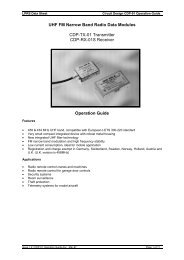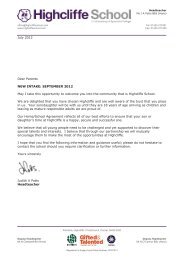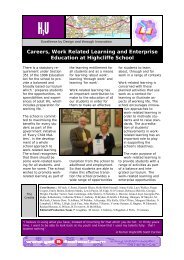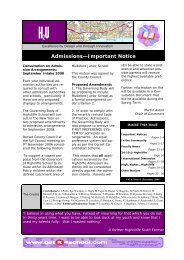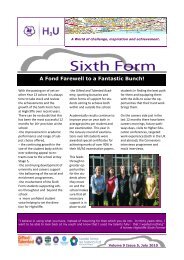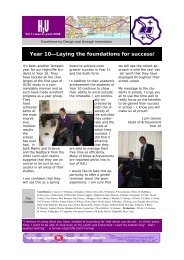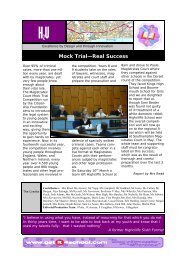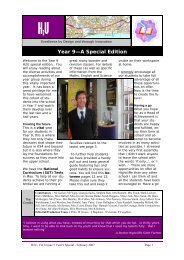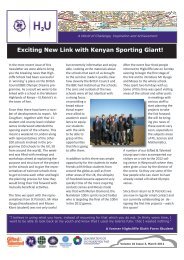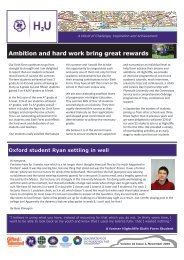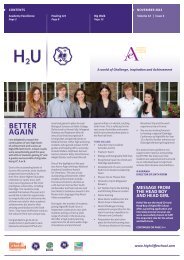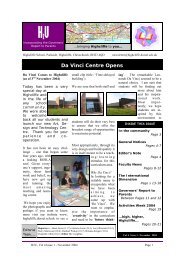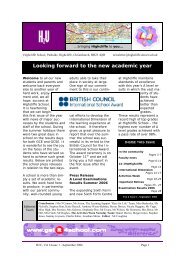GOVERNORS' ANNUAL REPORT TO PARENTS ... - Highcliffe School
GOVERNORS' ANNUAL REPORT TO PARENTS ... - Highcliffe School
GOVERNORS' ANNUAL REPORT TO PARENTS ... - Highcliffe School
Create successful ePaper yourself
Turn your PDF publications into a flip-book with our unique Google optimized e-Paper software.
2. Learning S uppor t – provision under the S EN Code of Practice (see<br />
separate handbook for details), including in- class support and s pecialist<br />
teaching<br />
3. Pastoral Care – suppor ting s tudents who have emotional/behavioural<br />
barriers to lear ning; enabling all to benefit from the curriculum provided<br />
4. Counselling/Mentoring – individual contact with trusted adult<br />
(teacher or other) for students with particular problems<br />
5. Outside Agencies – where appr opr iate, liaison with agencies such as<br />
Education Welfare Officer, Educational Psychologist, Behaviour Suppor t<br />
6. S tudent Grouping – suppor ting differentiation by grouping students<br />
appr opriately for the s ubj ect and their ability<br />
7. Differentiated S chemes of Work – access to lear ning at their own level<br />
for all students<br />
8. Work-related curriculum – differentiating the curriculum for some<br />
students at KS4, disapplying s ome of the National Curriculum. and<br />
offering wor k placements<br />
9. Careers Information – together with Progress File and including Wor k<br />
Experience, helping s tudents make per s onal action plans and s ee their<br />
learning as part of a continuum<br />
10. Literacy strategy – fostering attention to literacy in all subjects,<br />
improving the bas ic s k i lls of some s tudents<br />
11. Numeracy strategy – improving bas ic k i lls and s uppor ting numeracy in all<br />
subjects<br />
12. NQT suppor t scheme – tutoring Newly Qualified T eacher s to enable<br />
them to us e appr opr iate teaching and lear ning styles<br />
13. I CT – where appr opr iate us ing I CT as a means of delivery of National<br />
Curriculum and s uppor ting s ome lear ner s by provision of laptop<br />
computers and s uitable s oftwar e<br />
14. Anti-bullying policy – fostering an ethos in which bullying is<br />
unacceptable and offering both peer and tutor /teacher support<br />
15. Anti-racis t policy – ensuring equal oppor tunities<br />
16. Parental contact – discussion with parents both formally at calendared<br />
meetings and by appointment, and infor mally<br />
17. Disabled access – improvements to the buildings and s ite for<br />
wheelchairs<br />
18. S ocial suppor t – lunchtime s uppor t for students who might become<br />
isolated<br />
19. Homework club – enabling s tudents to complete wor k on site with help if<br />
needed<br />
20. Diagnostic tes ting – to assist in identifying s tudents in need of support<br />
Whilst it is clear that all these s tr ategies and agencies are in place to ens ur e<br />
the inclus ion of all students, there ar e obvious ly some ar eas where ther e is<br />
need for improvement.<br />
T he S chool Handbook should s et out the pr ocedur e for moving towar ds special<br />
provision for inclusion, through the Lear ning S uppor t programme. ‘Inclusion’<br />
should never be a euphemis m for ‘exclusion’. An inclusive curriculum does not<br />
isolate s tudents because the teaching and lear ning offered in the classroom is




